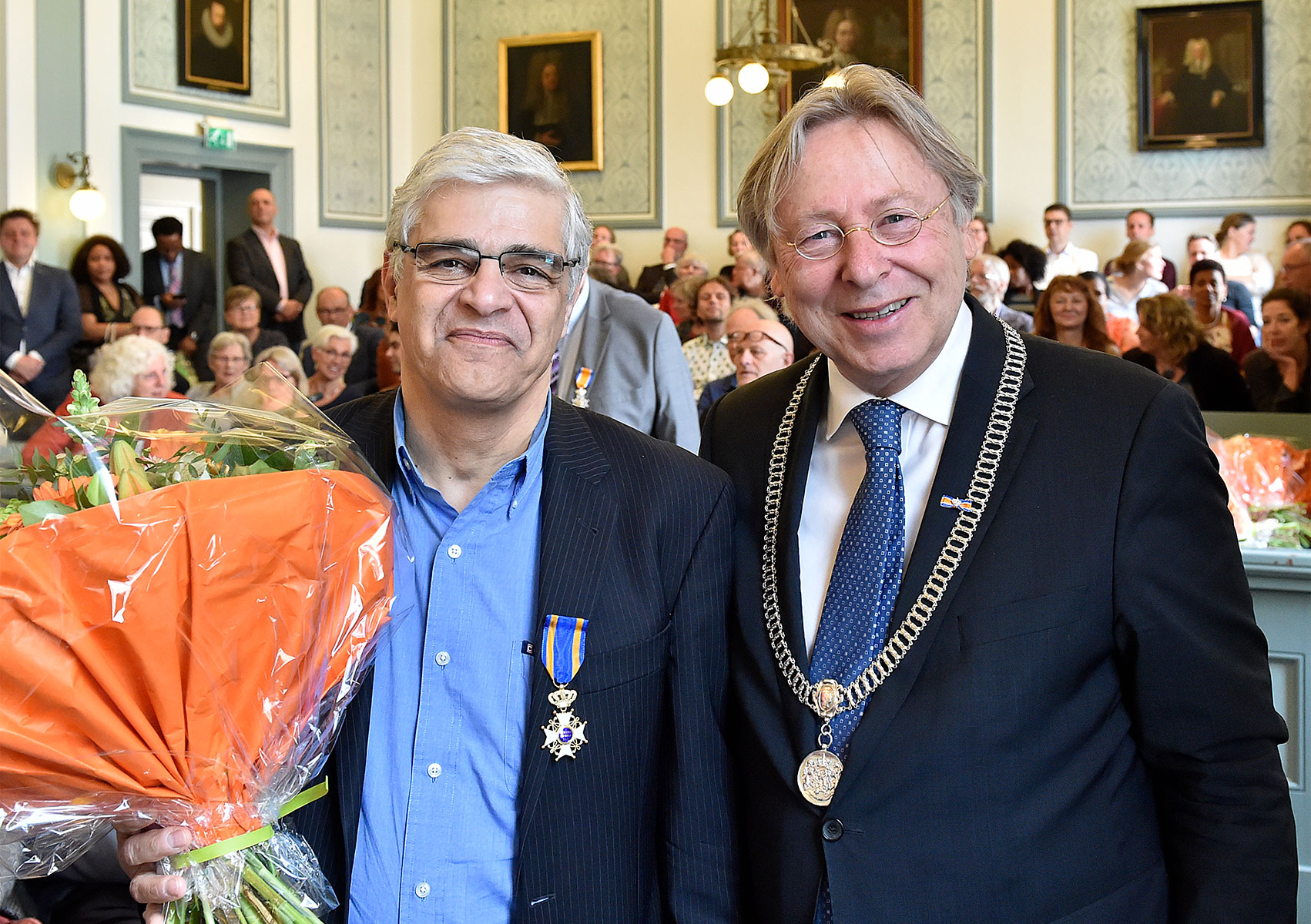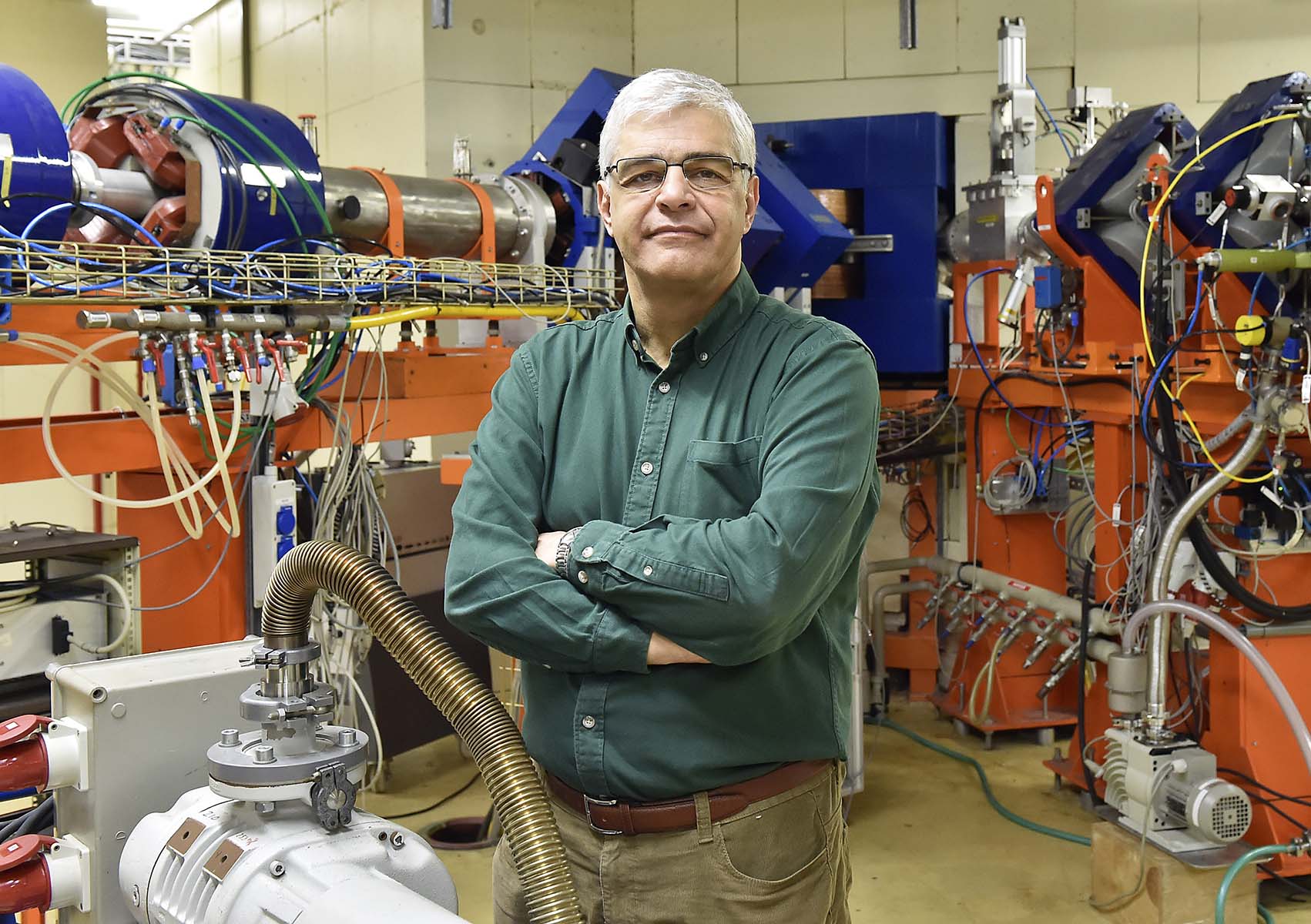Prof. Nasser Kalantar-Nayestanaki appointed Knight of the Order of the Netherlands Lion

On Thursday 26 April, Prof. Nasser Kalantar-Nayestanaki has been appointed Knight of the Order of the Netherlands Lion. Professor of Experimental Nuclear Physics Nasser Kalantar-Nayestanaki (Tehran, Iran, 1960) joined the KVI-Center for Advanced Radiation Technology (KVI-CART) at the UG in 1993. He has an impressive track record and has won international acclaim as a pioneering researcher in the field of the forces between nuclear particles.
Groundbreaking research into nuclear particles
Kalantar-Nayestanaki has made a revolutionary contribution to research into the forces that play a role between very small nuclear particles. He focuses on the differences in behaviour between systems that comprise two and three different tiny particles. To understand the way in which up to 100 particles in a nucleus can affect each other and which extreme forces play a role, it is important to include all particles in the calculations. Since the 1960s academics have used calculations based on the forces between two separate particles. Thanks to Kalantar’s research the calculation of the forces in systems that comprise three particles has improved greatly.
Original and inventive researcher
It is noteworthy that Kalantar conducted his research with modest resources, because KVI-CART had few financial resources and little technical expertise in the 1990s. It is thanks to his national and international contacts and great inventiveness that he succeeded in building a very original state-of-the-art detection system that could carry out measurements. The results that he achieved with his experimental research methods have had a significant impact on the discipline and have boosted international theoretical research into the forces between nuclear particles. Furthermore, his great dedication has put KVI-CART on the international map.
Global recognition of exceptional overview publication
Kalantar wrote an overview article about his field of research that was published by leading journal Institute of Physics in 2012. Within his discipline this exceptional publication earned great recognition for his work and academic reputation. His more than 350 publications are often cited worldwide. His peers have great respect for his work and his commitment to the international academic community. It was for his extraordinary knowledge and reputation that he was quite rightly named a Fellow of the American Physical Society in 2013, a society that elects only the very best physicists in the world as fellows. In 2017 he was elected a member of Academia Europaea, a European society of the top academics in the world. This was for his significant contribution to nuclear physics.

Ambassador of nuclear physics in the Netherlands
What is characteristic of Kalantar is his role as an ambassador of nuclear physics. He has put his heart and soul into the preservation of research at KVI-CART, and was able to convince its management team that a modern country such as the Netherlands cannot afford to turn its back on nuclear physics. When it was announced in 2004 that Dutch funding for his discipline would end within 10 years, he and the then director of KVI-CART sought to collaborate with GSI in Darmstadt, the largest nuclear physics institute in Germany. This led to a long-lasting Dutch participation in the development of a new international research facility: the Facility for Antiproton and Ion Research (FAIR). It was due to his tireless efforts that KVI-CART received EUR 7 million from GSI between 2007 and 2013 and was thus able to continue its technological activities. Under his leadership the Dutch-German collaboration has flourished.
Driving force behind international institute FAIR
At present Kalantar is considered one of the most productive and exceptional scientists within FAIR. This facility under construction aims to conduct fundamental research into the structure of matter and the processes that play a role in the cosmos. Within FAIR he has applied himself to research into extreme forms of matter and matter under extreme conditions. He has also taken on the role of representative of the over 3500 academics from over 53 different countries who are involved in FAIR. Although individual and national interests make this an extremely difficult role, he always succeeds in achieving focus and cohesion, thus demonstrating that he is a charismatic leader.
Great sense of justice
Kalantar has a great sense of justice, which is why he took up the fight against the Dutch policy of sanctions against Iran. Out of fear that Dutch atomic secrets would end up in the hands of Iran, the Dutch government placed restrictions on academics and students with an Iranian passport. Kalantar and two of his colleagues took the Dutch state to court and won. The measures were withdrawn.
Representing the interests of many
Alongside his many academic activities, Kalantar devotes a lot of time and energy to representing the interests of others. One such group is the UG staff, whose interests he has championed since 2010 as representative of the VAOM union in the Local Consultative Committee. He also played an active role in the Municipality of Groningen for many years as Chair of the Minorities Council. The Netherlands Physical Society is most grateful for his efforts to merge two scientific sectors. As independent chair of the election committee he has also generated enough support for fundamental changes to the Society’s election process. He was named Member of Merit in 2017 for his great service to the Society.
Inspiration for the young generation of researchers
Kalantar is not just an excellent researcher. As a lecturer he has also inspired many generations of students and young researchers. Fifteen of his PhD candidates have already earned their PhDs and seven others will follow soon. Institutes that work with these researchers are impressed by their high level of training and the excellent research skills that he has taught them.
Read the article on Kalantar: Turning lead into knowledge
More news
-
17 February 2026
The long search for new physics
-
10 February 2026
Why only a small number of planets are suitable for life
